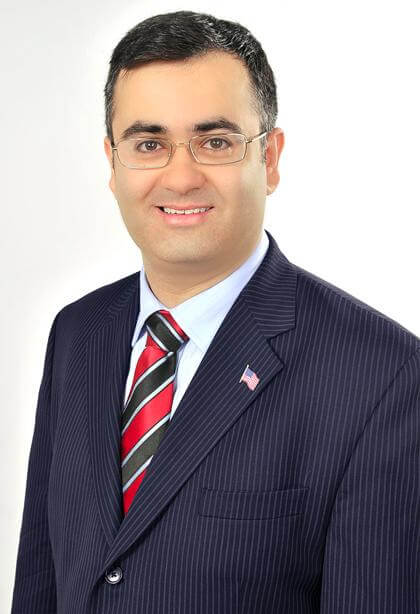By Anna Gustafson
When Albert Cohen knocks on fellow Bukharians’ doors to speak to them about his City Council race or to register them to vote, the first Bukharian to run for city office is frequently met with hesitation.
Many Bukharian Jews living in the Forest Hills-Rego Park area have come from places, including such countries as Tajikistan, Russia and Kazakhstan, where being politically engaged could prompt discrimination and harassment. They are, understandably, wary of becoming involved in political life.
Cohen, who is from Tajikistan, understands this well and has spent a countless number of hours convincing residents of the 29th Council District, currently represented by Councilwoman Melinda Katz (D-Forest Hills), to learn more about U.S. politics and register to vote.
His efforts have paid off, and Cohen, a Democrat, and his staff have been registering upwards of 150 to vote daily. Citizens who have not ever exercised their right to vote are now rallying behind a candidate who understands issues confronting the immigrant community, Cohen said.
“This is an historic election for the Bukharian community,” said Lilianna Zulunova, Cohen’s campaign manager. “People are very excited. We hear people saying if Albert Cohen wins, it’s not Albert Cohen who wins, it’s the whole community that wins.”
Bukharian Jews, who primarily come from Central Asia, faced economic decline and civil unrest following the breakup of the former Soviet Union, and many of the world’s 250,000 Bukharian Jews left Central Asia for places like Israel and the United States, with some 40,000 now living in Forest Hills and Rego Park, according to the United Jewish Appeal Federation of New York.
Cohen and his family left Tajikistan when he was 15 because of religious persecution, the candidate said.
A resident of Kew Gardens, where he lives with his wife and two young children, Cohen said he decided to run for the seat representing the 29th Council District after seeing the challenges that face immigrants as a lawyer in Forest Hills.
The candidate stressed newer immigrants and older residents face many similar issues, including health care and education.
“We have three hospitals that have closed — Parkway, St. John’s and Mary Immaculate — and that really is a big issue,” Cohen said.
Cohen said he aims to serve on the Council Health Committee and wants to invest in proactive, preventative health care, such as preemptive screenings to identify health concerns before an individual would have to go to the emergency room.
He also hopes to work to fund more programs benefitting the community’s teenage and younger residents.
“I see many youths unfortunately abusing drugs and alcohol,” Cohen said. “We need to provide more after-school programs.”
Cohen criticized the rise in taxes, such as the 14 percent increase in water and sewer rates and the 7 percent jump in real estate taxes.
The candidate said he wants to funnel more resources into services for the elderly, including nursing homes, day-care centers and Meals on Wheels programs.
He said he would like to increase the Bukharian representation in the local police force, which is representative of what he said he hopes to do in the community in general: encourage dialogue between the newer immigrants and the other residents who have lived in the area for a longer time.
Tensions have surfaced between the two groups in recent years, predominantly because some Forest Hills residents have been upset that some Bukharians would tear down smaller homes and replace them with mansions. Most recently, the Council approved a rezoning proposal for Cord Meyer, where many Bukharians live, which would mandate houses be no taller than 35 feet.
Cohen said the contentious issue highlights the need to encourage dialogue between the two groups.
“I will be a bridge between the immigrants and the older Americans,” Cohen said.
Reach reporter Anna Gustafson by e-mail at agustafson@cnglocal.com or by phone at 718-229-0300, Ext. 174.



































